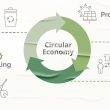Barclays has become the latest major British bank to exit the Net Zero Banking Alliance (NZBA), joining the ranks of HSBC and several U.S. lenders in stepping back from the United Nations-backed climate finance group. The decision, announced on Friday, raises fresh doubts about the alliance’s effectiveness in guiding the banking sector toward climate targets.
“After consideration, we have decided to withdraw from the Net Zero Banking Alliance,” Barclays said in a statement posted on its website. The bank cited the departure of numerous global peers, stating that the alliance “no longer has the membership to support our transition.”
Despite withdrawing, Barclays affirmed that its overarching commitment to achieving net-zero emissions by 2050 remained intact. The bank also noted it sees “a commercial opportunity” in financing the shift to a low-carbon economy. Earlier this week, it reported £500 million in revenue from sustainable and low-carbon transition finance during 2024, as part of the first update to its sustainability strategy in several years.
The NZBA was launched by the United Nations Environment Programme Finance Initiative and includes over 100 financial institutions aiming to align lending and investment portfolios with net-zero emissions by mid-century.
However, recent months have seen a string of high-profile exits, prompting a major revision of the alliance’s rules. Member banks voted to roll back some of the stricter requirements earlier this year in a bid to retain participation.
Jeanne Martin, co-director of corporate engagement at the responsible investment NGO ShareAction, called Barclays’ move “incredibly disappointing and a step in the wrong direction at a time when the dangers of climate change are rapidly mounting.”
In response, a spokesperson for the NZBA said the group remains focused on “supporting its members to lead on climate by addressing the barriers preventing their clients from investing in the net-zero transition.”





















